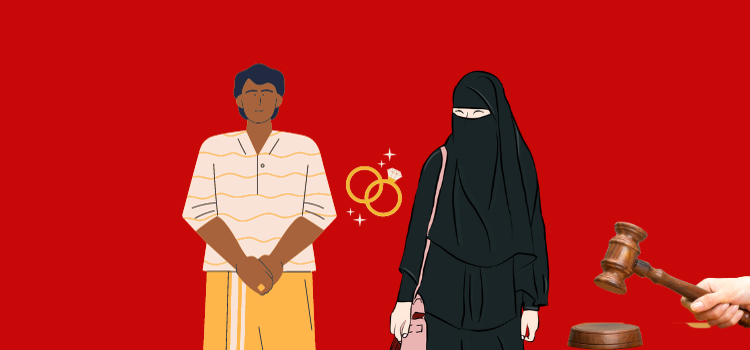Harmony in Diversity: The Legal Aspects of Hindu Boy and Muslim Girl Marriages in India
Posted On : November 11, 2023

Table of Contents
Introduction
Marriage between a Hindu boy and a Muslim girl in India is legally permissible and recognized under Indian law. The Indian legal system recognizes the freedom of individuals to choose their life partners, regardless of their religion or caste.
Key Aspects regarding inter-religion Marriages
Here are some key points regarding the legality of such marriages:
-
Special Marriage Act, 1954
In India, inter-religious marriages, including Hindu-Muslim marriages, can be solemnized under the Special Marriage Act, 1954. This act allows individuals of different religions to marry without converting to the religion of their partner. Both the Hindu boy and the Muslim girl can register their marriage under this act. -
Consent
For a marriage to be legally valid, it is essential that both parties give their free and informed consent. No one can be forced into a marriage against their will, and any such coercion is illegal. -
Age of Marriage
The legal age for marriage in India is 18 years for females and 21 years for males. Both the Hindu boy and the Muslim girl must meet these age requirements to marry legally. -
Registration
It is advisable for couples to register their marriage under the Special Marriage Act or with the local marriage registrar. Registration provides legal evidence of the marriage and simplifies matters related to inheritance, divorce, and other legal issues in the future. -
Religious Ceremonies
Couples are free to conduct religious ceremonies and rituals according to their respective faiths alongside a civil marriage under the Special Marriage Act. However, the civil registration is the legally recognized aspect of the marriage. -
Conversion
While conversion to one another's religion is not legally required for aHindu-Muslim marriage, some couples may choose to convert voluntarily for personal or societal reasons. Such conversions should be done willingly and not under any duress. -
Social and Family Challenges
In practice, Hindu-Muslim marriages may face societal and family challenges due to cultural and religious differences. It is essential for the couple to be aware of and prepared for these challenges and seek support from friends, family, and support organizations if necessary. -
Legal Rights
Both partners in an inter-religious marriage retain their legal rights, including the right to practice their religion, the right to inherit property, and the right to follow their personal beliefs.
Leading Case Laws
Here are a few notable case laws related to Hindu boy-Muslim girl marriages in India:
-
Lily Thomas v. Union of India (2000)
In this case, the Supreme Court of India upheld the validity of inter-religious marriages, stating that the Special Marriage Act, 1954, permits individuals of different religions to marry without converting to their partner's religion. The court emphasized the importance of the individual's right to choose their spouse irrespective of religion. -
Noor Jahan Begum vs. State of U.P. (2014)
This case involved a Muslim woman who converted to Hinduism and married a Hindu man. The Allahabad High Court held that the woman had the right to choose her religion and spouse, and her conversion was deemed valid. The court emphasized the freedom of religion and choice in marriage. -
Shafin Jahan v. Asokan K.M. (2018)
This case gained significant attention as it involved a Hindu woman who converted to Islam and married a Muslim man. The Kerala High Court initially annulled the marriage, but the Supreme Court later upheld the validity of the marriage, emphasizing the adult woman's right to choose her partner and religion.
These cases illustrate the Indian judiciary's commitment to upholding the rights and freedoms of individuals in matters of marriage and religion, irrespective of their backgrounds. They emphasize the importance of the individual's right to choose their partner and religion, provided that such choices are made voluntarily and without coercion. These legal precedents serve as a guide for upholding the legality and validity of Hindu boy-Muslim girl marriages in India.
Conclusion
It's important to note that while such marriages are legally permissible, they can sometimes be met with opposition or social challenges due to religious and cultural differences in India. It is advisable for couples to consult with legal professionals and ensure that they are aware of their rights and responsibilities when entering into such marriages. Additionally, seeking support from organizations that promote inter-religious harmony and understanding can be beneficial in navigating any societal challenges that may arise. For more information related about this, you should consult experienced family lawyers.
FAQs
-
Can Muslim girl and Hindu boy get married?
Yes, a Muslim girl and a Hindu boy can legally get married in India under the Special Marriage Act, 1954, without either partner converting to the other's religion.
























